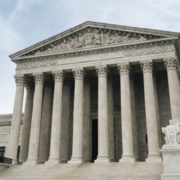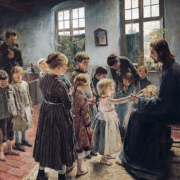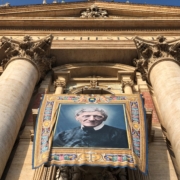Why We Teach Catholics the Truth
The argument for faithful Catholic education is most apparent in humanity’s worst moments.
It’s then that we realize how greatly our culture needs men and women full of virtue, wisdom, and reverence to help lead us to God. And we need Catholic homes, schools, and colleges that form young people for that task.
The terrible events this August in Charlottesville, Va., certainly stir yearning for a renewed culture. Observers worldwide saw an absurd display of racism, political theater, moral vacancy, and tragic violence that left dozens injured and three dead.
The protests and counter-protests, disputing the future of a statue of Confederate General Robert E. Lee, occurred on and around the campus of the University of Virginia—
a rather typical secular university, in the sense that it’s been compromised by political correctness and relativism. But UVA is also the sort of institution that many Catholic colleges and universities try to emulate, because of its impressive resources, commitment to faculty research, and social prestige.
What this respected university cannot do, apparently, is fulfill its basic mission! It cannot teach truth when it is needed most, as it was last month.
During the Charlottesville violence, UVA President Theresa Sullivan issued public statements declaring that the “ideologies and beliefs” of the protesters contradicted the University’s values of “diversity, inclusion, and mutual respect.” Critics wondered why she didn’t show greater moral outrage against racism and violence.
That prompted UVA professor Chad Wellmon to take to the pages of the Chronicle of Higher Education with a candid defense of Sullivan and the modern research university. In most of American education, morality and divine revelation are formally excluded as unworthy of academic consideration. Why should anyone, he asked, look to a public university for “moral clarity”?
The university has moral limitations. Universities cannot impart comprehensive visions of the good. They cannot provide ultimate moral ends. Their goods are proximate. Faculty members, myself included, need to acknowledge that most university leaders lack the language and moral imagination to confront evils such as white supremacy. They lack those things not because of who they are, but… because of what the modern research university has become.
What that is, according to Wellmon, is “a health center, a federal contractor, a sports franchise, an event venue, and, almost incidentally, a university devoted to education and knowledge.”
Because moral truth is excluded from the modern secular university, Wellmon has acknowledged and accepted that in the wake of the Charlottesville protests, he needs to severely limit what he can discuss in the classroom:
When I welcome my students [back to school]… I will discuss white supremacy and the march, but I will use language different than the one my wife and I used with our three children. To them we spoke in the language of our faith tradition—in terms of the image of God, the church, and Christian love. When I speak to my students, I will do so in the language of the university and its traditions—in terms of open debate, critique, and a love of knowledge.
How awful! Wellmon’s students need the very same truths that he taught his children. But the modern university—which by definition should be dedicated to all truth—restricts what its professors can teach.
Not so in faithful Catholic higher education. As Pope Saint John Paul II explained in Ex corde Ecclesiae:
It is the honor and responsibility of a Catholic University to consecrate itself without reserve to the cause of truth. …[A] Catholic University is distinguished by its free search for the whole truth about nature, man, and God. The present age is in urgent need of this kind of disinterested service, namely of proclaiming the meaning of truth, that fundamental value without which freedom, justice, and human dignity are extinguished.
Catholic education does not reject the limited “values” of modern higher education: “diversity, inclusion, and mutual respect,” as Sullivan described them. Respectful dialogue is quite helpful to human discovery and understanding, and at a Catholic college, it’s a matter of respecting the dignity of each person as a child of God.
But for dialogue to be fruitful, it requires a commitment to reason and truth. That’s increasingly rare outside the faithful Catholic colleges recommended in our Newman Guide. A university that questions truth and fails to recognize God, the “fount of truth,” is subject to academic imperialism: the most politically correct conformists, the loudest activists, or the most powerful experts determine what is “true.”
This state of academia undermines even the possibility for respectful dialogue. Thus we find that campus debate too often turns to protest, shouting, and even mob-enforced censorship instead of rational discussion.
Moreover, in today’s secular university, too often the most important ideas—those relating to God, morality, and purpose—are treated as relatively equal in value. Academia places greater value on a diversity of viewpoints, instead of identifying those that are correct. Wellmon is honest about the modern university’s inability to teach students “visions of the good” and “ultimate moral ends;” these must be learned from God’s revelation, which the secular university rejects.
The Catholic educator, however, can teach these and more. The scope and capacity for teaching, learning, and understanding is vastly greater at a faithful Catholic college, because reality is embraced fully and without limitation. This is why our patron, Cardinal Blessed John Henry Newman, argued that a true “university”—embracing the entirety of knowledge—must be Catholic.
At the faithful Catholic college, every discipline has a firm foundation in reality. Theology is not only taught but bears upon every study. Artists and writers appreciate the human experience, full of meaning and hope in the reality of Christ. Science and medical students learn the ethics of caring for God’s creation and wonder at the intentionality of every living thing and process. Math and engineering students embrace the divine order on which every rule and formula depends.
Questions of morality are not excluded but are central to a Catholic education. Catholic educators face sin and redemption honestly, for the good of their students. They draw lessons from those tragedies that result from our fallen nature—like the events in Charlottesville—without hiding truth within the privacy of their homes.
Hopefully, the events in Charlottesville have inspired Catholic families to talk about the sin of racism, respect for human dignity, and the sometimes blurry distinctions between preserving and celebrating history. As students begin the school year, we need that conversation to continue in the classroom.
We need educators who teach and witness to Catholic morality and assent to God’s authority, as given to us through the Catholic Church. We need the same truths—all truth—to be embraced, sought, and reverenced in our homes, schools, and colleges.
Anything less deprives young people of a complete formation. Anything less deprives them of truth.

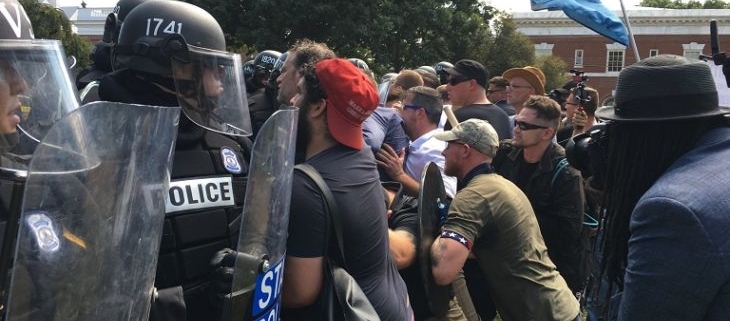
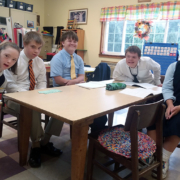

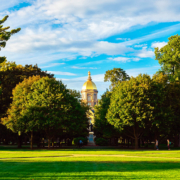 Photo by David Mark via Pixabay CC0
Photo by David Mark via Pixabay CC0 